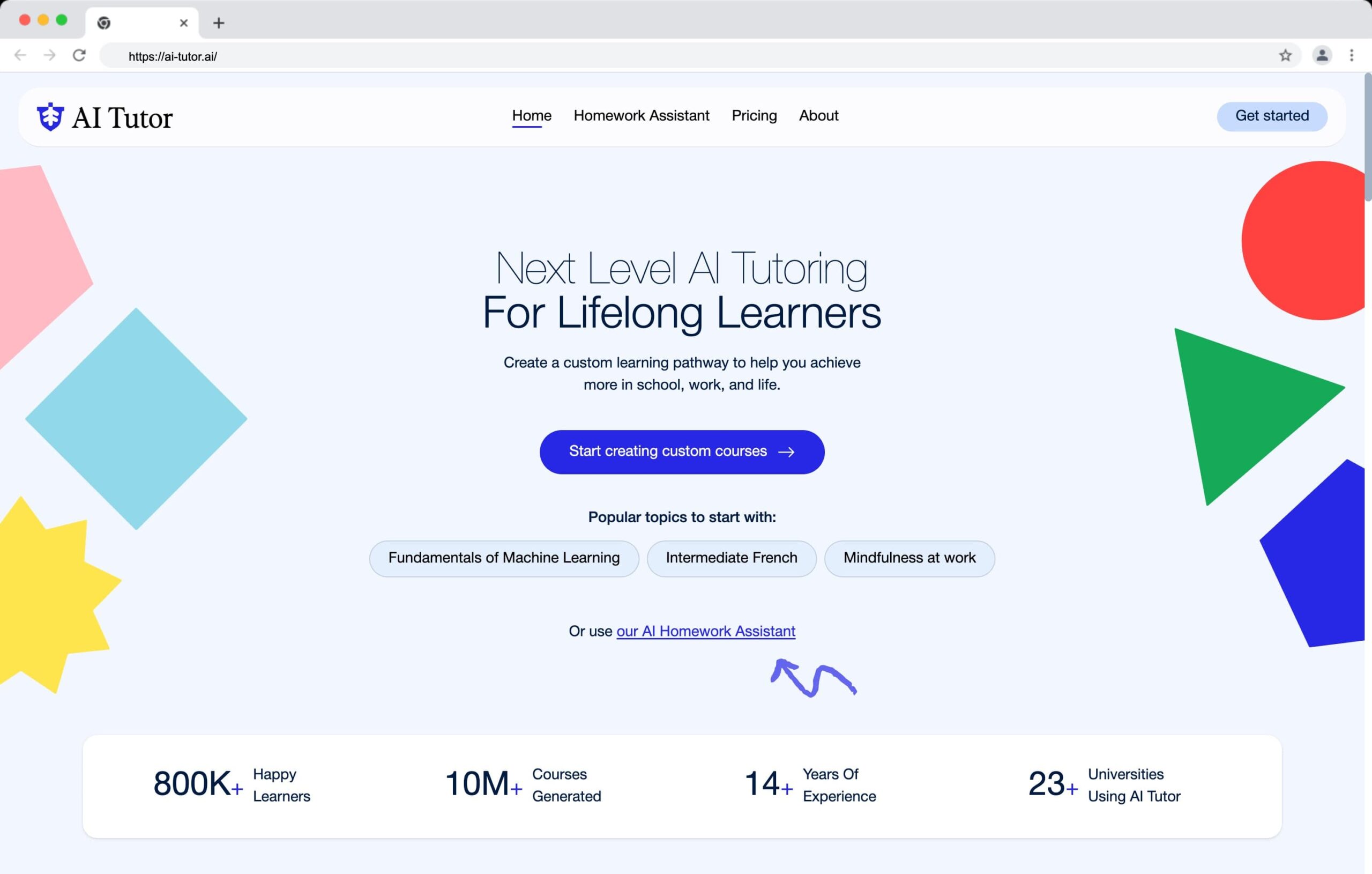Keeping up with academic materials, lectures, and lesson prep can eat up hours every week.
That’s where AI summary apps come in. Whether you’re teaching, studying, or prepping content, these tools compress long-form information into useful, readable formats in seconds.
After testing over a dozen platforms, I’ve shortlisted the top five AI summary tools that stand out for their accuracy, usability, and versatility in tutoring environments.
Each has strengths in different content types—some are better with academic journals, others specialize in video or web summaries.
Top 6 AI Summary Apps at a Glance
- NoteGPT – Best mobile app for recording, transcribing, and summarizing lectures on the go
- ChatGPT + Plugins – Most versatile tool for summarizing text, video, and documents in any format
- Scholarcy – Smartest choice for summarizing academic papers, research, and structured reports
- Eightify – Top pick for turning long YouTube lectures into clean, easy-to-digest bullet points
- Glasp – Best tool for capturing, highlighting, and summarizing content from websites and videos
- Resoomer – Ideal for breaking down argumentative essays and extracting core ideas quickly
Comparing Best AI Summary Apps, Side by Side
Quick Comparison Table
| Tool | Best For | Starting Price | Free Plan | Summary Formats Supported |
|---|---|---|---|---|
| NoteGPT | Mobile transcription + note summaries | $6.99/week | Yes | Audio, YouTube URLs, PDFs, live recordings |
| ChatGPT + Plugins | All content types | $20/month | Limited | PDFs, URLs, transcripts, videos, websites |
| Scholarcy | Academic and research-heavy documents | $9.99/month | Yes | PDFs, Word files, academic journals |
| Eightify | Summarizing YouTube lectures | $4.99/month | Yes | YouTube videos only |
| Glasp | Web-based reading + highlights | $8.99/month | Yes | Articles, web pages, YouTube |
| Resoomer | Essay breakdown + argumentative text | $7/month | Yes | Long-form text, essays, online content |
Best AI Summary Apps Reviewed
1. NoteGPT: Best AI Summary Note Taker for iPhone
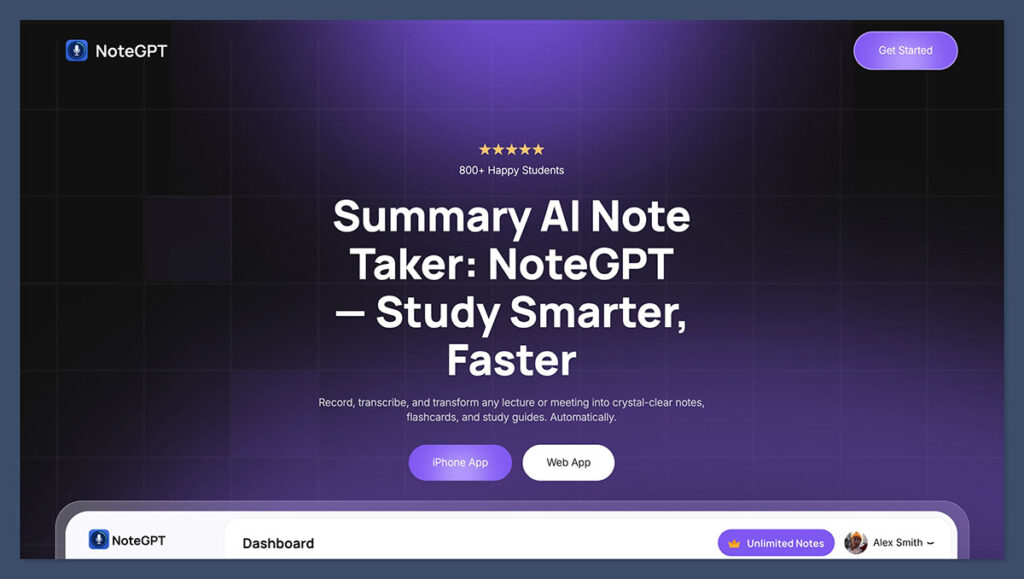
💰 Pricing:
- Free to download
- In-app purchases:
- Weekly: $6.99
- Monthly: $14.99
- Yearly: $49.99
- Offers a free trial that smoothly transitions to paid (cancel anytime)
Supports: Audio recordings, YouTube URLs, PDFs, and lecture transcriptions
NoteGPT stands out as a mobile-first AI transcription and summarization app designed for students, professionals, and anyone attending meetings or lectures.
I tested it during live tutoring sessions and it reliably turned conversations into readable summaries within seconds.
With built-in support for over 50 languages and a clean interface, NoteGPT makes real-time note-taking seamless—even when handling technical or multilingual content.
Pros
- Converts spoken audio from lectures or meetings into accurate text with minimal delay.
- Summarizes long transcriptions into concise bullet points, making reviews quick and easy.
- Accepts content from various sources including YouTube links and PDF uploads.
- Offers a lightweight, user-friendly mobile experience that doesn’t feel bloated or slow.
- Supports transcription in multiple languages, which is great for international students and ESL use.
Cons
- Requires a paid subscription for full feature access, including unlimited summaries.
- Available only on Apple devices (iOS and macOS), which may exclude some users.
Best For
Tutors, students, or professionals who want to record, transcribe, and summarize audio on-the-go using a mobile device.
2. ChatGPT + Plugins: Best for All-in-One Summarization
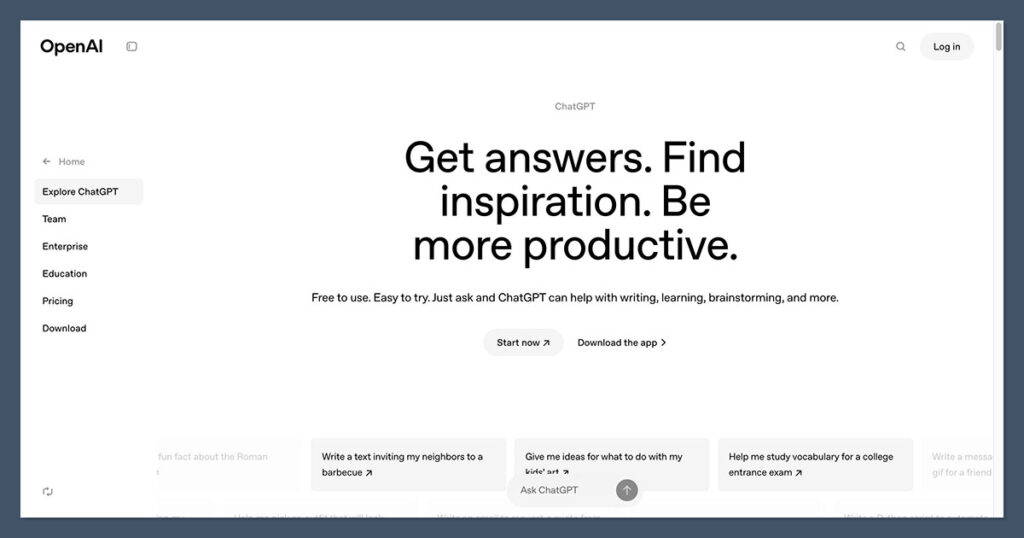
ChatGPT is my most-used tool by far. When paired with the right plugins, it handles just about anything I throw at it—from 50-page PDFs to multi-hour webinars.
I’ve used it to summarize textbooks, student essays, Zoom transcripts, even emails. The flexibility is unmatched.
Supports: PDFs, websites, transcripts, YouTube, Google Docs, and more.
Pros
- Handles a wide range of content formats and delivers context-aware summaries.
- Converts dense documents into bullet points, outlines, or Q&A formats.
- Supports real-time queries for clarification, letting me dig deeper into key topics.
- Saves time by automating lesson prep from student-submitted materials.
Cons
- Requires a paid subscription to access plugins and advanced features.
- Takes some practice to write effective prompts for high-quality results.
Pricing
- ChatGPT Plus costs $20/month, unlocking GPT-4 access and plugin functionality.
- Plugins like AskYourPDF and Link Reader are included within this subscription.
Best For
Tutors or educators who need a universal solution for summarizing nearly any type of educational material.
3. Scholarcy: Best for Academic Research and Papers
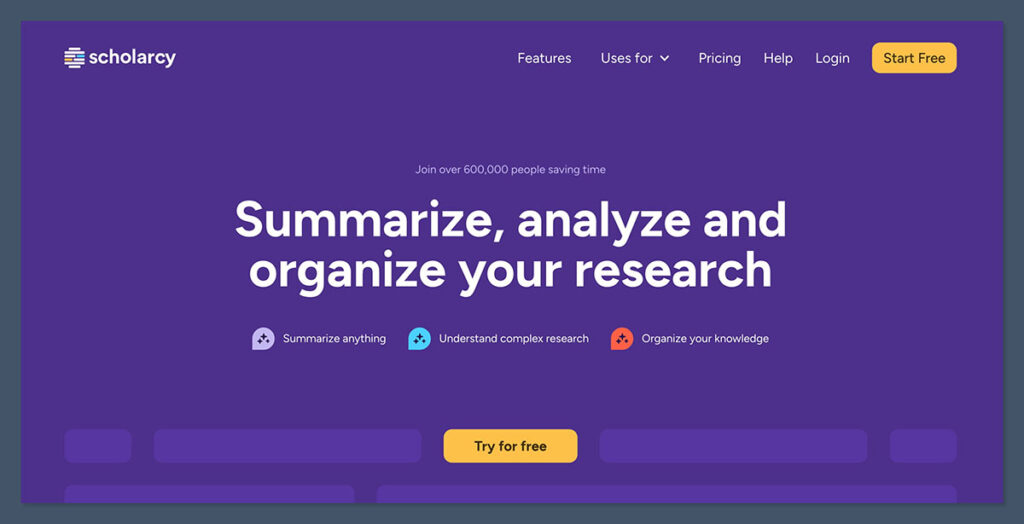
Scholarcy is built specifically for academic summarization, and it shows.
When I’m dealing with dense research papers or scientific journals, this tool extracts all the relevant sections—methods, conclusions, citations—into clean, structured cards.
It saves me the effort of scanning entire papers for teaching material.
Supports: PDFs, Word docs, journal articles, and academic manuscripts.
Pros
- Breaks academic papers into digestible summary cards with clickable references.
- Generates auto-formatted bibliographies and citation lists for quick use.
- Highlights data, outcomes, and key arguments clearly for faster comprehension.
- Integrates easily with referencing tools like Zotero and Mendeley.
Cons
- Limited support for non-text files like video or multimedia content.
- Interface feels outdated compared to modern productivity tools.
Pricing
- Free plan available with basic summarization tools.
- Premium plan costs $9.99/month and includes full-text analysis, export features, and reference extraction.
Best For
Tutors, researchers, or students working in science, healthcare, law, or any field that relies heavily on academic literature.
4. Eightify: Best for YouTube Lecture Summaries
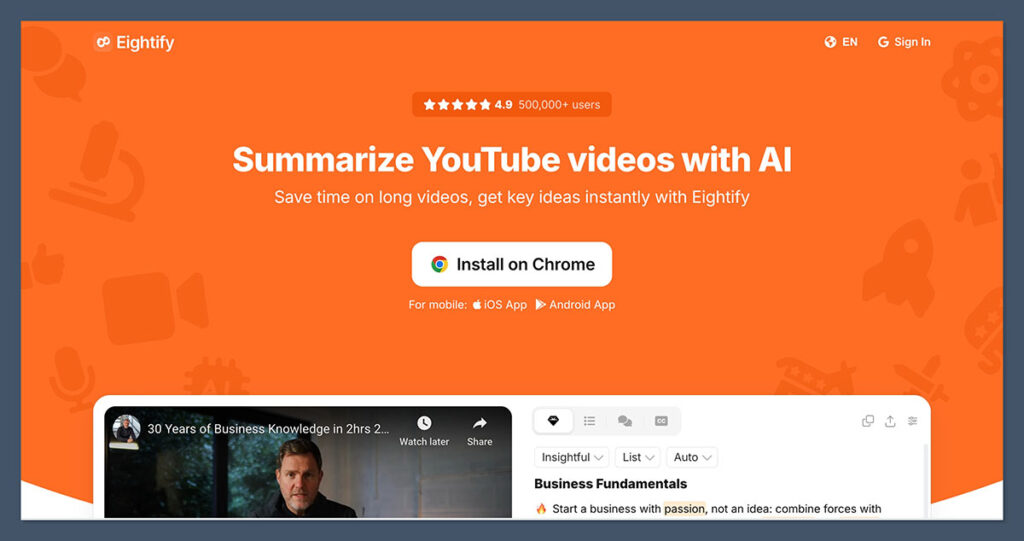
If your tutoring involves a lot of YouTube-based content—MOOCs, explainer videos, or online lectures—Eightify is a game-changer.
It condenses long videos into eight bullet points, making it easier to identify whether a video is worth watching or summarizing for students.
Supports: YouTube videos (lectures, tutorials, interviews)
Pros
- Delivers clean, structured summaries from long-form YouTube videos.
- Lets me quickly scan educational content before recommending it to students.
- Speeds up video-based lesson prep by removing the need to watch in full.
- Works directly from the Chrome extension, saving time during research.
Cons
- Limited to YouTube only; doesn’t support PDFs or written content.
- May skip nuanced information in more complex or technical lectures.
Pricing
- Basic plan is free with limited summaries per day.
- Premium plan is $4.99/month, offering unlimited use and priority processing.
Best For
Tutors and students who rely on YouTube content for subject understanding or supplementing textbook-based lessons.
5. Glasp: Best for Highlighting and Web Research
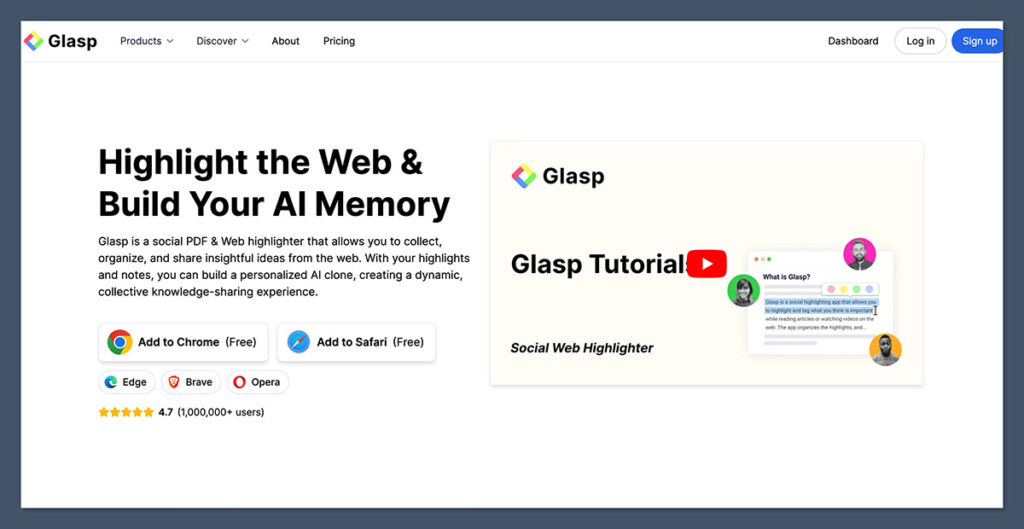
Glasp is more than a summarizer—it’s a digital learning notebook. I use it when researching online to save quotes, add highlights, and auto-generate summaries from the content I’m collecting.
It also helps students stay organized when building study packs from multiple sources.
Supports: Web pages, articles, YouTube videos (with timestamped summaries)
Pros
- Allows real-time highlighting and annotation across articles and video transcripts.
- Connects seamlessly with Readwise and Notion to store your notes.
- Auto-generates summaries based on selected highlights for easy review.
- Offers community-based recommendations and shared highlight libraries.
Cons
- Doesn’t accept uploads of offline files like scanned PDFs or DOCX documents.
- Summary quality depends on the depth of your highlights.
Pricing
- Free plan includes highlighting, note-taking, and public sharing.
- Pro plan starts at $8.99/month, unlocking Readwise integration, PDF uploads, and custom exports.
Best For
Anyone building a study system, creating curated learning libraries, or compiling resources for tutoring sessions.
6. Resoomer: Best for Essay Structure and Long-Form Text
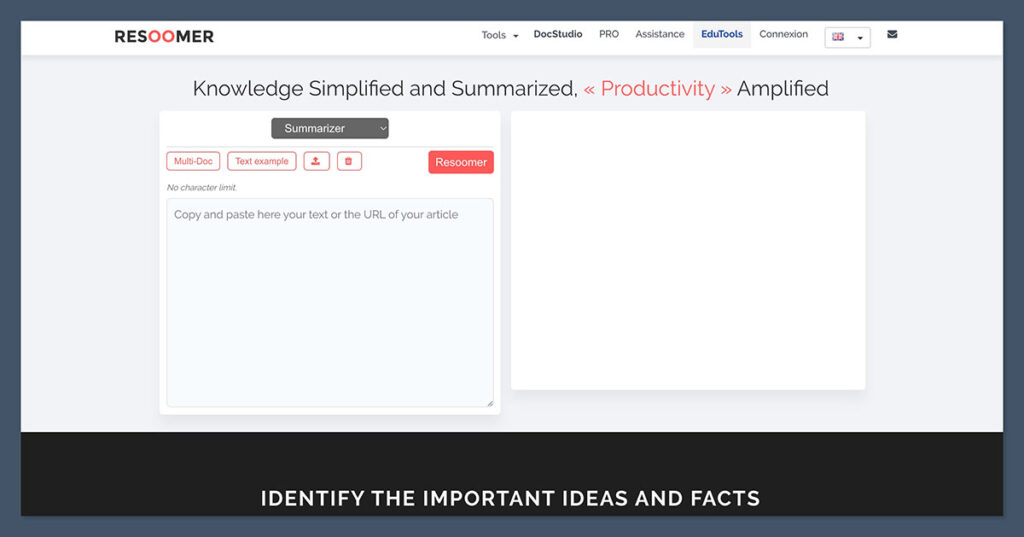
Resoomer is tailored for breaking down argumentative or persuasive content. I’ve used it when helping students understand essay structure, thesis support, or logic flow.
Its ability to isolate ideas and arguments helps with critical thinking and comprehension.
Supports: Text-based content, news articles, essays, online blogs, and PDFs.
Pros
- Extracts key points from long essays or editorials to simplify teaching sessions.
- Offers multiple summary modes, including automatic question generation.
- Breaks down arguments and counterpoints clearly, useful for teaching debate.
- Includes audio summaries and multiple language support for ESL students.
Cons
- Doesn’t handle non-text formats like video or scanned files.
- Interface lacks polish and may feel dated.
Pricing
- Free tool is available with limited functionality.
- Premium plan is $7/month, offering support for long documents, summary formats, and downloads.
Best For
Tutors working in literature, history, philosophy, or debate coaching where argumentative clarity is key.
Summary: Which Summary App Should You Choose?
Here’s how I’d break it down based on your needs:
| Tool | Best For | Why It Stands Out |
|---|---|---|
| ChatGPT + Plugins | All-around content summarization | Flexible, powerful, and adaptable to any format |
| Scholarcy | Academic and scientific material | Extracts structured information with citations |
| Eightify | YouTube-based learning and lectures | Converts videos into quick reference bullet points |
| Glasp | Research and online study curation | Combines highlights, summaries, and integrations |
| Resoomer | Essays, editorials, and logical analysis | Focuses on argument mapping and critical points |
If you work across various content types, I’d start with ChatGPT Plus.
For more focused needs, Scholarcy is unbeatable for academic writing, and Eightify adds serious value to any video-based curriculum.
What to Consider Before Choosing
Before committing to any tool, think through these key factors:
- Type of content: Are you dealing more with videos, long articles, academic papers, or web-based reading?
- Output style needed: Do you prefer flashcards, bullet points, full-text summaries, or outlines?
- Platform compatibility: Does the app integrate with your current tools (Notion, Readwise, Google Docs)?
- Pricing: Are you comfortable paying monthly, or do you need free options to get started?
Finding the right AI summary app can genuinely transform how you teach or study.
What used to take hours—like reading through dense research papers, watching lengthy lectures, or creating study guides—now takes just minutes.
But choosing the right tool depends on what kind of content you work with and how you prefer to process information.
Most of these platforms offer free trials or starter plans, so don’t be afraid to test a few. Once you find one that fits, it can easily become an essential part of your teaching toolkit.
